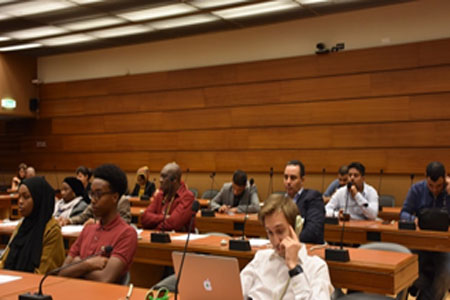
Afrasianet - We all look forward to an African future that is compatible with the struggles of its peoples for independence and freedom.
Maat discusses the human rights situation in Africa within the Human Rights Council.
Maat along with the International Alliance for Peace and Development held a side event entitled "Human Rights in Africa and the role of the Commission on Human and Peoples" on the sidelines of the 39th Session of the Human Rights Council. Where the side event main discussion was about the quest of African countries since gaining independence to try to create a general framework parallel to human rights system. The side event also discussed the most important human rights violations on the African continent.
Ayman Okeil illustrated in his speech that the establishment of the African Commission did not contribute effectively to the elimination of violations of human rights and peoples from the African political scene. Focusing mainly on the issue of refugees and migrants, as there are more than 18 million African refugees registered with the Office of the High Commissioner for Refugees. The issue of human trafficking is also one of the most anxious human rights concerns. As the continent continues to suffer from illegal immigration, exploitation of individuals, and trading them as workers with a very little pay. He also addressed the situation of African women in his speech and the marginalization she suffers in most African countries. He also mentioned that one of the biggest challenges facing the African continent is the financial corruption that is widespread in Africa.
Okeil also reviewed the challenges which face the Commission on Human Rights during the course of performing its role, the most important of which is funding, cooperation of States and the presence of effective mechanisms to implement the decisions of the Commission.
Moreover, Dr. Mohamed Ismail demonstrated another perspective of human rights during his talk, which is the human right to live in a clean environment. He highlighted the grave violations against the African people as a result of the pollution and the environmental dangers in which they are living. He called upon the regimes of the major industrial countries which represent the main cause of that crisis, and all countries worldwide to take legislative measures consistent with all international treaties and conventions related to the right to a clean environment. In accordance with the various climate agreements, in order to address the effects of the environment pollution, especially those that occur in the border areas, which provoke conflicts and wars and lead to high rates of illegal migration, which expose migrants and locals to grave dangers.
Maat made a plenty of recommendations at the end of its side event, the most prominent of which is to amend the status of NGOs in the Commission on Human Rights and Peoples to allow them to play an effective role in achieving and promoting human rights, not just spectators and observer. Through finding a mechanism to comment on the periodic reports of States.
Also, Maat recommended the end of foreign interference in African affairs and to address governments that sponsor and fund terrorist organizations in more than one country in Africa and threaten stability and security, particularly in the Red Sea and Horn of Africa.

